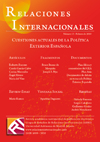The role of Ideas, Values and Beliefs of the leader in the Foreign Policy definitions and actions: The case of Spain 2000-2008
Keywords:
White Book , presidentialism , leader, consensus , national interest , beliefs, values , foreign policy , ideasCopyright (c) 2010 Carola GARCÍA-CALVO

This work is licensed under a Creative Commons Attribution-NonCommercial-NoDerivatives 4.0 International License.
Abstract
This article is a first attempt to study the relation between the various ideas, beliefs and personal values that determine the world-views of political leaders and the formulation of a state’s foreign policy. Going beyond the premise of an overarching ‘general interest’ as the basic principle in foreign policy, it aims to provide empirical proof of the existence or not of personal ‘styles’ in foreign policy, based on a study of the Spanish case between 2000 and 2008.
Employing a methodology that combines both quantitative and qualitative techniques, it draws the conclusions, first, that the ideas, beliefs and values of leaders ?that make up their political-philosophical convictions? give rise to specific world views. Secondly, it shows that when the consensus in Spanish foreign policy broke down after 2000, the ideas, beliefs and values of leaders ?ie, their ideological traits? came to the fore, fostered by the Spanish political system’s presidentialist slant. Finally, the provision of a White Book on Foreign Policy, on the basis of a consensus over the entire political spectrum, restored a stability and predictability that had sometimes been absent during the period.





